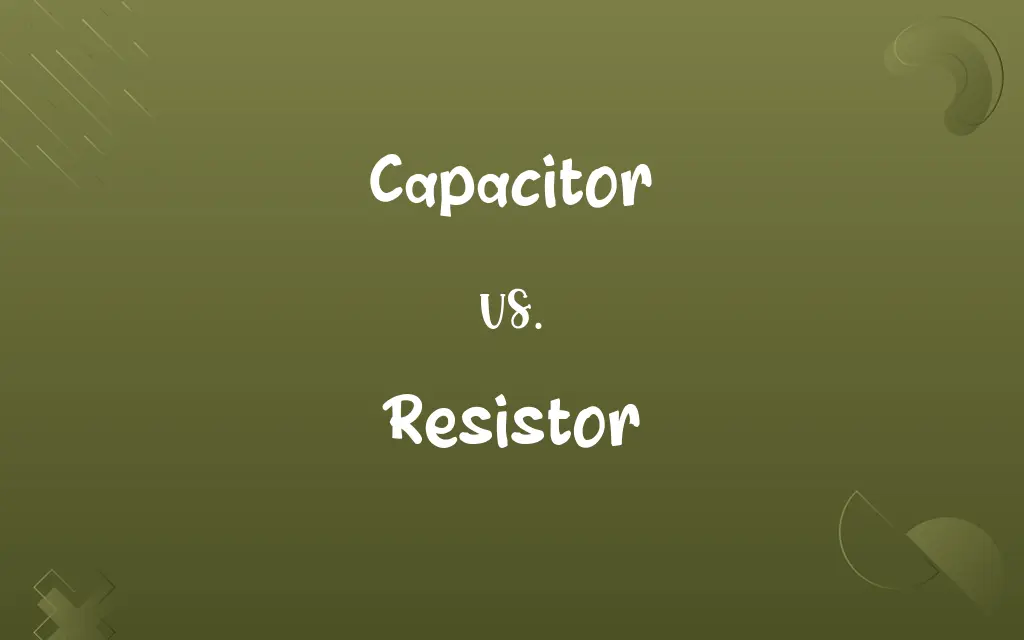Capacitor vs. Resistor: Know the Difference

By Shumaila Saeed || Published on January 10, 2024
A capacitor stores electrical energy in an electric field, while a resistor reduces current flow and lowers voltage levels within circuits.

Key Differences
A capacitor is a passive electronic component that stores energy in an electric field between its plates. It's used to hold a charge temporarily and can release energy rapidly. Capacitors are essential in various applications, including filtering, power conditioning, and signal processing. A resistor, by contrast, is a device that resists the flow of electric current. It's used primarily to control the current and voltage levels within an electronic circuit, ensuring they stay within safe or required levels.
Shumaila Saeed
Jan 10, 2024
Capacitors can be found in many forms, such as ceramic, electrolytic, and supercapacitors, each suited for specific applications based on their capacity and performance characteristics. They are integral to alternating current (AC) and direct current (DC) applications for energy storage and release. Resistors, available as fixed or variable types, are used to manage current and protect components from excessive currents. They are fundamental in both AC and DC circuits for controlling and dividing voltage.
Shumaila Saeed
Jan 10, 2024
The functioning of a capacitor is based on its ability to store and release electrical charge, characterized by its capacitance value measured in farads. This makes them ideal for tasks like smoothing out the output of power supplies and separating signals of different frequencies. Resistors function by dissipating electrical energy as heat, with their resistance value, measured in ohms, determining how much they impede the current flow.
Shumaila Saeed
Jan 10, 2024
In timing circuits, capacitors are often used in conjunction with resistors to create specific time delays or oscillation frequencies. This is because the time it takes for a capacitor to charge or discharge is dependent on the resistance in the circuit. In contrast, resistors are used to set the current levels in a circuit, impacting the brightness of LEDs or the speed of motors, without the dynamic charge-discharge cycle of a capacitor.
Shumaila Saeed
Jan 10, 2024
In terms of energy efficiency, capacitors do not dissipate energy as resistors do; they merely store and release it. This makes capacitors more efficient in applications requiring energy storage and quick release. Resistors, however, are inherently energy dissipative, turning electrical energy into heat, which can be a desirable trait in applications like heaters but a source of inefficiency in other circuits.
Shumaila Saeed
Jan 10, 2024
ADVERTISEMENT
Comparison Chart
Function
Stores electrical energy in an electric field
Reduces current flow, lowers voltage levels
Shumaila Saeed
Jan 10, 2024
Energy Handling
Stores and releases energy, non-dissipative
Dissipates energy as heat
Shumaila Saeed
Jan 10, 2024
Applications
Timing circuits, filtering, power conditioning
Controlling current, dividing voltage
Shumaila Saeed
Jan 10, 2024
Types
Ceramic, electrolytic, supercapacitors, etc.
Fixed, variable, wirewound, carbon film, etc.
Shumaila Saeed
Jan 10, 2024
ADVERTISEMENT
Capacitor and Resistor Definitions
Capacitor
An electronic component that stores and releases electrical energy.
The capacitor in the circuit stored the energy needed for the flash in the camera.
Shumaila Saeed
Dec 18, 2023
Resistor
A basic electronic component for circuit protection and control.
Resistors are used in nearly every electronic device for circuit control.
Shumaila Saeed
Dec 18, 2023
Capacitor
A component used in timing and oscillation circuits.
The timing of the circuit was controlled by the capacitor.
Shumaila Saeed
Dec 18, 2023
ADVERTISEMENT
Resistor
A variable or fixed component for regulating electrical properties.
He adjusted the variable resistor to change the circuit's behavior.
Shumaila Saeed
Dec 18, 2023
Capacitor
An element that temporarily holds an electric charge.
The capacitor held the charge before releasing it to power the device.
Shumaila Saeed
Dec 18, 2023
Resistor
A component that impedes the flow of electric current in a circuit.
They used a resistor to reduce the current to the LED.
Shumaila Saeed
Dec 18, 2023
Capacitor
A device used for filtering and stabilizing voltage in circuits.
They added a capacitor to smooth out the voltage fluctuations.
Shumaila Saeed
Dec 18, 2023
Resistor
A device for controlling voltage and current in electronic circuits.
The resistor ensured the motor received the correct voltage.
Shumaila Saeed
Dec 18, 2023
Capacitor
A part of electronic systems for energy storage and signal processing.
Capacitors are essential in audio systems for signal processing.
Shumaila Saeed
Dec 18, 2023
Resistor
An element that dissipates energy in the form of heat.
The resistor in the circuit acted as a heat source.
Shumaila Saeed
Dec 18, 2023
Capacitor
An electric circuit element typically consisting of two metallic plates separated and insulated from each other by a dielectric, used to store charge temporarily or to filter signal frequencies. Also called condenser.
Shumaila Saeed
Dec 13, 2023
Resistor
A device used to control current in an electric circuit by providing resistance.
Shumaila Saeed
Dec 13, 2023
Capacitor
(electronics) An electronic component capable of storing electrical energy in an electric field; especially one consisting of two conductors separated by a dielectric.
Shumaila Saeed
Dec 13, 2023
Resistor
One who resists, especially a person who fights against an occupying army.
Shumaila Saeed
Dec 13, 2023
Capacitor
A device used in electronic circuits to hold electrical charge, consisting of two conducting plates separated by a nonconducting (dielectric) medium; it is characterized by its capacitance.
Shumaila Saeed
Dec 13, 2023
Resistor
(electronics) An electric component that transmits current in direct proportion to the voltage across it.
Shumaila Saeed
Dec 13, 2023
Capacitor
An electrical device characterized by its capacity to store an electric charge
Shumaila Saeed
Dec 13, 2023
Repeatedly Asked Queries
What is a capacitor used for in a circuit?
It's used for storing and releasing electrical energy.
Shumaila Saeed
Jan 10, 2024
Are capacitors energy efficient?
Yes, they store and release energy without dissipating it.
Shumaila Saeed
Jan 10, 2024
Can capacitors filter signals?
Yes, they're used in filtering applications.
Shumaila Saeed
Jan 10, 2024
Why are resistors important in circuits?
For controlling current and protecting components.
Shumaila Saeed
Jan 10, 2024
What is the primary function of a resistor?
To reduce current flow and control voltage in a circuit.
Shumaila Saeed
Jan 10, 2024
Are resistors used in timing circuits?
Not typically, they're more for current and voltage regulation.
Shumaila Saeed
Jan 10, 2024
Can a capacitor power a device?
It can release stored energy but not continuously power a device.
Shumaila Saeed
Jan 10, 2024
Are capacitors used in every electronic device?
Most, especially where energy storage or filtering is needed.
Shumaila Saeed
Jan 10, 2024
What are the different types of resistors?
Fixed, variable, wirewound, and carbon film, to name a few.
Shumaila Saeed
Jan 10, 2024
What is a common use of resistors in household electronics?
To control the brightness of LEDs or speed of motors.
Shumaila Saeed
Jan 10, 2024
Do capacitors have a polarity?
Some types, like electrolytic capacitors, do.
Shumaila Saeed
Jan 10, 2024
How are resistors and capacitors combined in circuits?
Often in timing or filtering applications for specific functionalities.
Shumaila Saeed
Jan 10, 2024
What types of capacitors are there?
Ceramic, electrolytic, supercapacitors, among others.
Shumaila Saeed
Jan 10, 2024
Share this page
Link for your blog / website
HTML
Link to share via messenger
About Author
Written by
Shumaila SaeedShumaila Saeed, an expert content creator with 6 years of experience, specializes in distilling complex topics into easily digestible comparisons, shining a light on the nuances that both inform and educate readers with clarity and accuracy.









































































